Author: Loopy Lu
Today, a war of words about plagiarism erupted between two “L2 giants” and attracted the attention of the public.
PolygonZero claimed on Twitter that MatterLabs, the development company behind zkSync, copied some open-source code from Polygon without declaring it. However, zkSync responded by stating that only 5% of the code came from PolygonZero and they made proper citations, criticizing the other party for lacking the spirit of open-source.
Currently, this incident is still escalating, and just recently, a third party has joined the dispute. MantaNetwork accused Polygon of plagiarizing their code, claiming that the so-called “plagiarized” code was actually created by Manta staff.
- Quick look at Coinbase’s Q2 financial report Revenue exceeds expectations, but still loses nearly 100 million US dollars
- Data Revolution Unveiling the Panorama of Decentralized Storage
- New York Times opposes issuing a gag order against SBF before the trial.
Did Boojum plagiarize Plonky2?
For zkrollup, zero-knowledge proof systems are crucial and also challenging. The development of this part tests the research and development capabilities of various vendors. Polygon’s PolygonZero developed their own zero-knowledge proof systems, Plonky2 and Starky.
In the introduction by their development team, Plonky2 is described as the “fastest solution to date” and “100 times faster than existing alternatives,” and it is compatible with Ethereum. It combines the advantages of PLONK and FRI, with fast proofs and a trustless setup; it also combines the advantages of SNARKs, supporting recursion and low verification costs on Ethereum.
This system was officially released to the public as early as January 2022 and became open-source in August of the same year.
In July of this year, zkSync also launched its own proof system. This proof system, named Boojum, has many features and also boasts “world-class proof performance” with lower hardware requirements. zkSync claims that Boojum can run on consumer-grade GPUs with just 16GB of GPURAM.
Interestingly, a blog post by PolygonZero appeared last night, accusing Boojum of plagiarism.
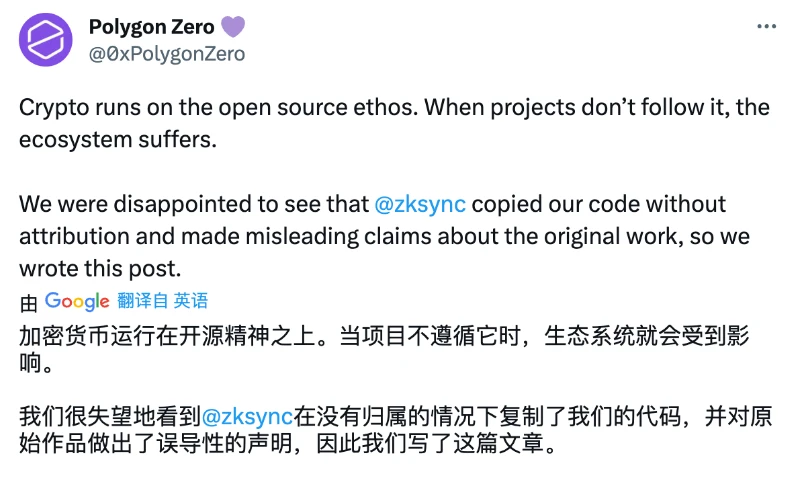
Specifically, PolygonZero accuses zkSync of directly copying their open-source code without properly indicating the source according to the copyright declaration.
It should be noted that although many projects make their code open-source, it does not mean that third parties can use this open-source code freely. When a project is open-sourced, the open-source code is usually accompanied by a copyright declaration.Plonky 2 uses the ALianGuaiche License V2 and MIT License as open-source licenses.
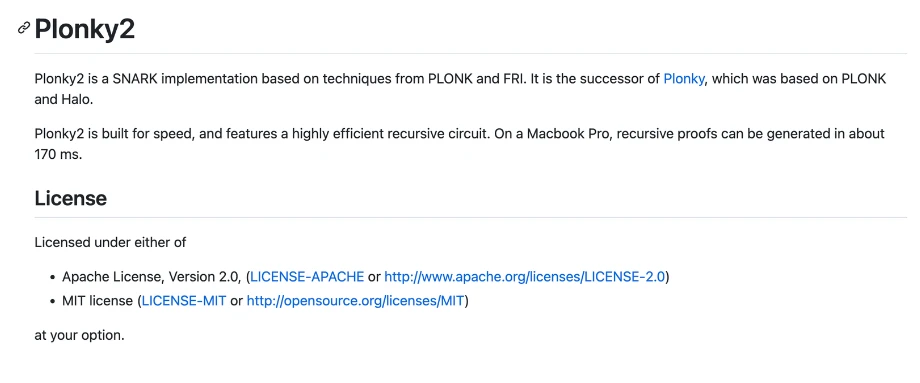
If a third party wants to use this code, they must comply with the copyright agreement.
In this dispute, the ALianGuaiche open-source license stipulates that any derivative code modified from code that complies with this agreement must include the original author’s copyright declaration and other explanations. The MIT License also requires the inclusion of the original author’s information.
So, did zkSync actually use Plonky2’s code? Polygon provides the following evidence.
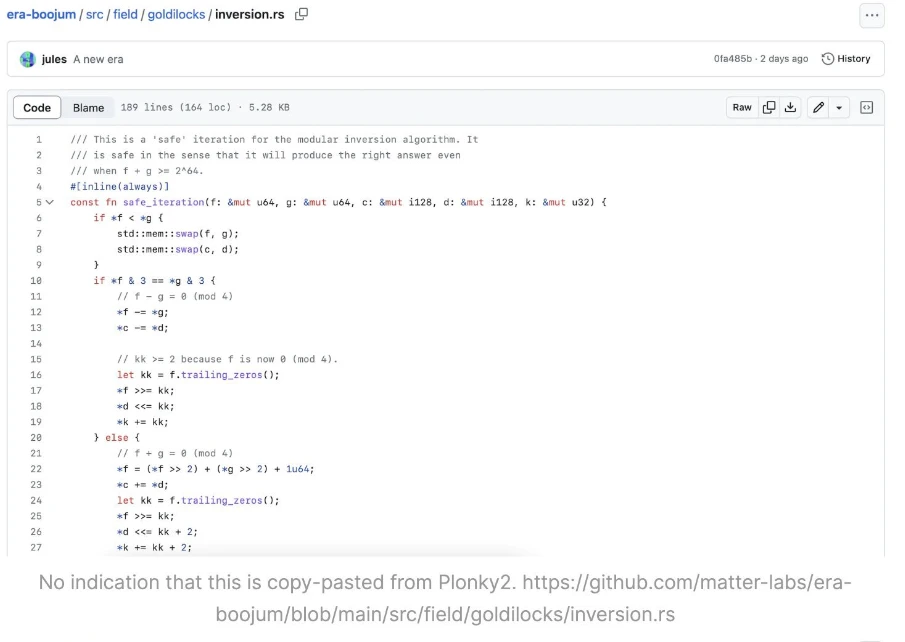
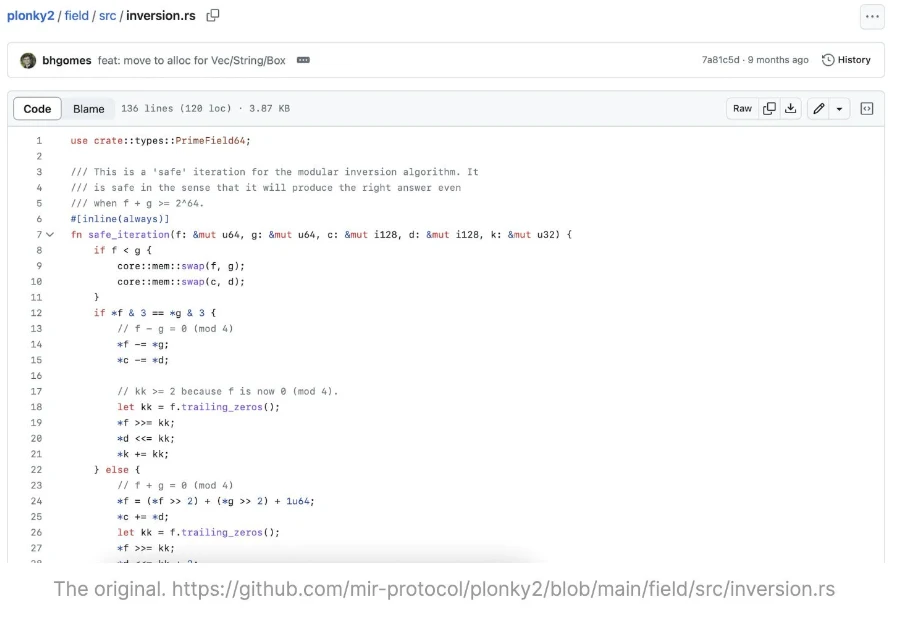
Undoubtedly, these two pieces of code are exactly the same. This also confirms Polygon’s accusation.
In addition to the blatant copy of the code, Polygon also accuses zkSync of plagiarizing (or perhaps borrowing?) its overall design ideas. Polygon believes that Boojum and Plonky2 are very similar. They both use the same parallel repetition strategy to enhance the soundness of small domains and use similar custom gates to efficiently perform arithmetic recursive verifications. In addition, zkSync’s Poseidon MDS matrix and parameters are also the same as those discovered by the PolygonZero team.
Polygon also accuses MatterLabs of exaggerating Boojum’s promotion. In the introduction of Boojum, this system is claimed to be 10 times faster than Plonky2. Polygon sarcastically remarks, “I wonder how this is achieved, as the key performance part of (Boojum) code is directly copied from Plonky2.”
Who is violating the spirit of open source?
MatterLabs has responded to this incident. Its CEO Alex Gluchowski posted a long tweet to explain the plagiarism incident in detail.
Regarding the accusation of direct copying, only 5% of the Boojum code is based on Plonky2, and it is not without copyright notice, they provide a clear indication in the first line of the module’s main file.

Boojum code
In the Readme file, they also mention information about Plonky2.

Boojum's Readme file
Gluchowski bluntly said, “The first line of our module prominently features Plonky2. Is there anything more prominent than the first line?”
As for the technical plagiarism, Gluchowski explained that both Boojum and Plonky2 are implementations of Redshift. RedShift was launched by MatterLabs long before the publication of the Plonky2 paper three years ago.
Regarding the performance aspect, they state that the performance parameters are based on a neutral third-party benchmark. The performance is tested using SHA256, and the test results are completely neutral.
This war of words based on whether or not there is plagiarism has reached a higher level. Both sides have taken up the baton of values and launched accusations against each other. Gluchowski openly stated that he “completely agrees” with the PolygonZero team’s support for the open-source viewpoint – “building software openly and sustainably benefits everyone.”
He stated that open source means sincere collaboration. Polygon’s actions are by no means in line with the spirit of the open-source movement. “If you don’t want others to use parts of your code, maybe open source is not for you?”
Comedy Climax, Both Sides Plagiarizing?
In the Ethereum scalability war, zkEVM is considered the holy grail of scaling. zkEVM has a crucial impact on the deployment experience of developers’ contracts, and because Ethereum’s initial design did not consider ZK-friendliness, it means that zero-knowledge proofs require a lot of resources for computation.
Currently, the entire zkEVM market is still in its early stages. Developing EVM-compatible ZKRollups is extremely difficult, which has led to intense competition in this field.
Earlier this year, MihailoBjelic from Polygon and AlexGluchowski from Matter Labs had intense discussions on some technical issues of zkSync. This also led to both Polygon and Matter Labs being eager to launch the first scalable zkEVM. This may also be a catalyst for the plagiarism scandal.
As the situation continues to escalate, the war of words intensifies, and both sides stick to their claims.
Starkware, another competitor in the ZK-Rollup space, expressed their observation, with co-founder UriKolodny saying that this is not the first time code plagiarism has occurred. “I bet an ice cream, this won’t be the last time either.”
Starkware ecosystem steward LouisGuthmann added, “The accusations (against Polygon Zero) are serious. What’s more important is that honest and clear code attribution is the essence of open source.”
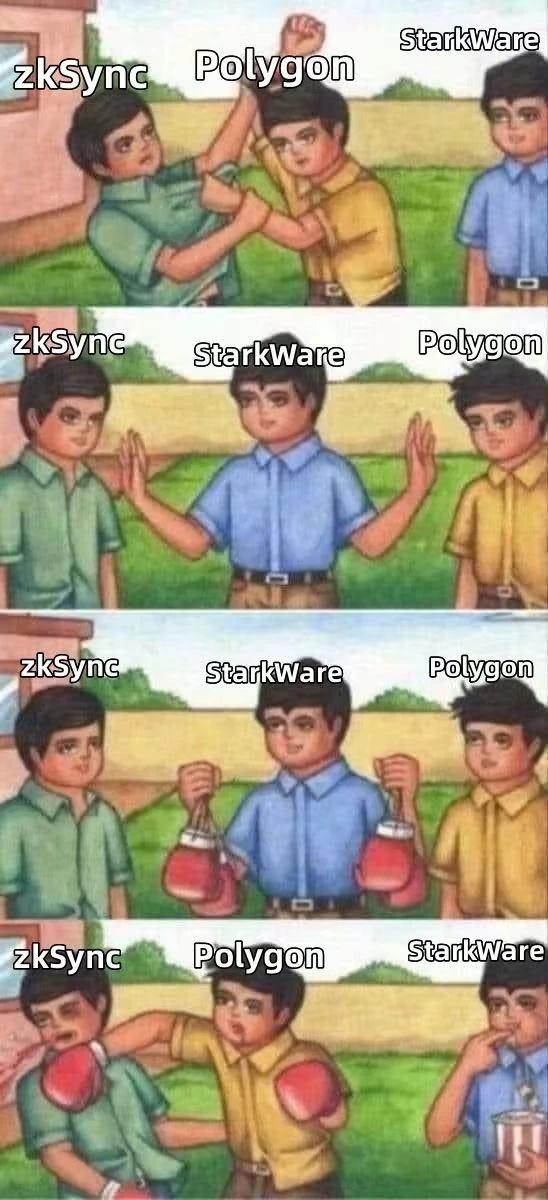
While both sides stick to their claims, a third party has entered the battlefield.
Just now, the MantaNetwork Chinese community tweeted that Polygon Labs claimed zkSync used their code without attribution, but in fact, this code was originally created by Brandon from MantaNetwork. This has further escalated the attention on the event.
Who is the real author of this code? Currently, this event has not concluded, and Odaily Star Daily will continue to follow up and report.
Like what you're reading? Subscribe to our top stories.
We will continue to update Gambling Chain; if you have any questions or suggestions, please contact us!